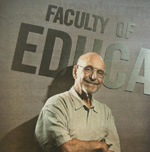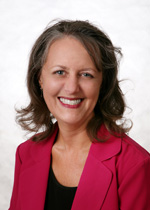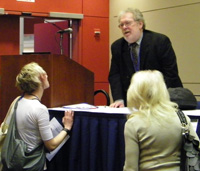The International Reading Association has a tradition of research-based professional development resources for literacy educators. This tradition continues with this year’s series of research sessions at the IRA 58th Annual Convention from April 19 to 22 in San Antonio, Texas.
Research Address & Awards with Brian Cambourne and Carrice Cummins
 The Research Address & Awards on Saturday, April 20 feature Brian Cambourne from the University of Wollongong in Australia presenting Doin' What Comes Naturally: Using Nature's Best Biological Ideas to Inform Classroom Practice. Research into the teaching of reading accumulates in ever-increasing bulk—with all manner of contradictory and confusing results—culminating in the so-called "Reading Wars."
The Research Address & Awards on Saturday, April 20 feature Brian Cambourne from the University of Wollongong in Australia presenting Doin' What Comes Naturally: Using Nature's Best Biological Ideas to Inform Classroom Practice. Research into the teaching of reading accumulates in ever-increasing bulk—with all manner of contradictory and confusing results—culminating in the so-called "Reading Wars."
 Battle lines have been drawn around what the concepts of "evidence" and "good science" are supposed to look like,especially when it comes teaching and learning. Cambourne intends to explore the proposition that scientifically based evidence, which can inform classroom pedagogy has been around for millions of years. Event Chair Carrice Cummins, President of the International Reading Association, will celebrate the 2013 research award and grant recipients during this session.
Battle lines have been drawn around what the concepts of "evidence" and "good science" are supposed to look like,especially when it comes teaching and learning. Cambourne intends to explore the proposition that scientifically based evidence, which can inform classroom pedagogy has been around for millions of years. Event Chair Carrice Cummins, President of the International Reading Association, will celebrate the 2013 research award and grant recipients during this session.
Saturday Sessions with the IRA Literacy Research Panel
 Literacy Research Panel members will share their ideas on promising new literacy initiatives and important research priorities in the U.S. and around the world in a session entitled The IRA Literacy Research Panel: Big Ideas, Literacy Needs, and National Priorities on Saturday, April 20. IRA Director of Government Relations Rich Long and Panel members P. David Pearson, Peter Afflerbach, Carrice Cummins, Nell Duke, Peter Freebody, Virginia Goatley, John Guthrie, Kris Gutierrez, Kenji Hakuta, Peter Johnston, Gloria Ladson-Billings, Nonie Lesaux, Elizabeth Moje, Annemarie Sullivan Palincsar, Linda Phillips, Timothy Shanahan, Catherine Snow, William Teale, and Karen Wixson will discuss hot topics and ideas to assist educators with literacy implementation. Presenters will use an interactive format to respond to questions from the audience to provide insights into current literacy policy and practice.
Literacy Research Panel members will share their ideas on promising new literacy initiatives and important research priorities in the U.S. and around the world in a session entitled The IRA Literacy Research Panel: Big Ideas, Literacy Needs, and National Priorities on Saturday, April 20. IRA Director of Government Relations Rich Long and Panel members P. David Pearson, Peter Afflerbach, Carrice Cummins, Nell Duke, Peter Freebody, Virginia Goatley, John Guthrie, Kris Gutierrez, Kenji Hakuta, Peter Johnston, Gloria Ladson-Billings, Nonie Lesaux, Elizabeth Moje, Annemarie Sullivan Palincsar, Linda Phillips, Timothy Shanahan, Catherine Snow, William Teale, and Karen Wixson will discuss hot topics and ideas to assist educators with literacy implementation. Presenters will use an interactive format to respond to questions from the audience to provide insights into current literacy policy and practice.
The Panel continues its discussion in The IRA Literacy Research Panel: Policy Issues and Impact later on Saturday the 20th. With national and state policy having a daily impact on school practices and classroom literacy instruction, the Literacy Research Panel is focusing on policy issues in their discussions. In this session, IRA Director of Government Relations Rich Long and Panel members P. David Pearson, Peter Afflerbach, Nell Duke, Virginia Goatley, Kris Gutierrez, Gloria Ladson-Billings, Annemarie Sullivan Palincsar, Timothy Shanahan, Catherine Snow, and Karen Wixson will share recent policy developments and potential responses to new initiatives, intended to help educators navigate and articulate research-based responses to policymakers. In addition, audience/IRA members will be invited to suggest possible policy questions for consideration.
Featured Research Sessions on Saturday
The Project READI: Teaching adolescents to read and write arguments in science, English, and History presentation with Cynthia Greenleaf, Carol Lee, and Cynthia Shanahan will showcase the ongoing work of READI, a Reading for Understanding project funded through IES. This project focuses on a definition of reading for understanding that recognizes the role of disciplinary practices in reading comprehension and focuses on argumentation within the disciplines as the avenue towards deep understanding of text. Three disciplinary teams have been designing and studying instruction aimed at helping middle and high school students comprehend and write arguments, drawing on the help of exemplary teachers and teacher networks. The three team leaders will share what they have learned from this work.
In the “Research Into Practice” session entitled The Common Core's Three Sources for Text Complexity: What We Know, What We Need to Know presenter Elfrieda H. Hiebert will discuss the Common Core State Standards’ identified three-part model for establishing the complexity of texts. This presentation will examine existing scholarship for each source—quantitative, qualitative, and reader-task—with the goal of identifying support for educators in selecting and teaching texts in ways that increase students' capacity with complex text (Standard 10). Ways in which practitioners and researchers can work together to bolster text assessment systems will be identified in the final section of the presentation.
In Meeting the Challenges of the Changing Demographics: Assessment and instruction that makes a positive difference in ELs' Success presenter Kathleen Mohr will identify ways to meet ELs' linguistic challenges and provide paths to increase students' success. Paul Boyd-Batstone presents CALL as a formative assessment tool and Mayra Daniel discusses informal reading inventories for Spanish/English bilinguals. Joyce Nutta and Kouider Mokhtari focus on critical considerations for instruction in the mainstream content area classroom. Louise C. Wilkinson presents a tool to assist teachers in comparing and contrasting English with many of the other languages spoken by ELs in US schools. David Schwarzer addresses translingual education in this country's multilingual and transnational learning communities.
Saturday’s Teacher as Researcher Workshop
The Becoming a Teacher Researcher: Exploring IRA's Teacher as Researcher Grant workshop will explore IRA's Teacher as Researcher grant and provide information on what it means to be a teacher researcher and how to conduct action research. Award winners from previous years Eric Claravall, Joanna Kaiser, Michele Cacioppo, and Nakeiha Primus will be present to talk about their work. Committee members will address particular aspects of teacher research and answer questions.
Research Sessions on Sunday, April 21
 Nell K. Duke presents the Project-based Integrated Social Studies and Literacy Instruction featured research session on April 21. To meet the CCSS, students need to be deeply engaged in complex reading and writing. Standards-aligned project-based instruction is a promising means of achieving that engagement. In one study, Duke and colleagues found that students in high poverty settings who experienced two project-based integrated social studies and literacy units ended the year with the same level of achievement as children from wealthy settings on standards-based measures. In other words, project-based instruction closed the SES achievement gap in social studies and content literacy. Duke will describe the units involved in that study as well as others she and colleagues have developed.
Nell K. Duke presents the Project-based Integrated Social Studies and Literacy Instruction featured research session on April 21. To meet the CCSS, students need to be deeply engaged in complex reading and writing. Standards-aligned project-based instruction is a promising means of achieving that engagement. In one study, Duke and colleagues found that students in high poverty settings who experienced two project-based integrated social studies and literacy units ended the year with the same level of achievement as children from wealthy settings on standards-based measures. In other words, project-based instruction closed the SES achievement gap in social studies and content literacy. Duke will describe the units involved in that study as well as others she and colleagues have developed.
Also on April 21, Jim Anderson leads a Research Into Practice session entitled Promoting and Supporting Families' First Languages and Cultures in a Bilingual Family Literacy Program: A Project with Immigrant and Refugee Families. In this session, Anderson reports on a three-year project in which his team implemented a bilingual family literacy project with 500 immigrant and refugee families from four linguistic groups in five different communities. He briefly traces the development of the program, describes the contexts in which it was implemented, and reports the results. Findings include: the four- and five-year-old children made significant gains in emergent literacy knowledge in English; families understood and supported home language maintenance; and families indicated they felt welcomed and comfortable in school and better understood the North American education system.
Diane Lapp and Douglas Fisher—along with numerous other authors—lead roundtable discussions in What's New in Language Arts Research? Looking Inside The Handbook of Research On Teaching of the Language Arts, Vol. 3. Authors will share the research supported current issues addressed in their chapters. Audience interaction will be greatly encouraged.
Research Into Practice Session on Monday, April 22
Melanie R. Kuhn and Paula J. Schwanenflugel present Rethinking Fluency: Instruction for the Common Core State Standards (CCSS) on Monday, April 22. They say that, if students are to become fluent readers, they need extensive opportunities to read a range of materials, from selections at their independent level to "stretch" texts. Yet it is often the case that students need scaffolding to experience success with challenging texts. Fortunately, research has identified several easy-to-implement approaches for fluency instruction that provide learners with the support necessary to read such selections. Given the integral role of challenging material in the CCSS, these approaches can play an important role in your literacy curriculum while allowing your learners access to the expanded vocabulary and conceptual knowledge such texts provide.
Research Poster Sessions
Poster sessions give Convention attendees the chance to interact with researchers in a more informal, intimate setting. At these open sessions, researchers answer questions and referring to their displays of photographs and charts. This year there will be poster session on Outstanding Dissertations; Interdisciplinary Units for Literacy Education; Meet the Researchers; Looking Inside the Classroom; Teacher Preparation, Teaching, and Coaching; Culturally Relevant Teaching: Language, Families, and Communities Focusing on Learners: Curriculum, Assessment, and Interventions; and Multiple Paths to Literacy in the 21st Century.
The IRA 58th Annual Convention runs from April 19 to 22, 2013, in San Antonio, Texas. Visit www.iraconvention.org and the iPlanner Program Grid and Event Search for details.